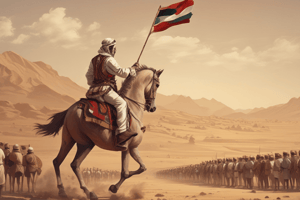Podcast
Questions and Answers
Arab nationalism was initiated by ______ communities, based on a rebirth of the language.
Arab nationalism was initiated by ______ communities, based on a rebirth of the language.
Christian
The Arab renaissance movement known as ______, opened up a rich dialogue about secularism and religious freedom.
The Arab renaissance movement known as ______, opened up a rich dialogue about secularism and religious freedom.
Nahda
Ottomans signed a secret treaty against Russia with ______ on 2 August 1914.
Ottomans signed a secret treaty against Russia with ______ on 2 August 1914.
Germany
At the start of World War I, the Ottoman Empire had ______ million inhabitants.
At the start of World War I, the Ottoman Empire had ______ million inhabitants.
One of the goals of the Ottomans during the war was to recover lost territories, mainly Egypt, Libya, ______, and Algeria.
One of the goals of the Ottomans during the war was to recover lost territories, mainly Egypt, Libya, ______, and Algeria.
The British pursued a double policy in the Arabian Peninsula by negotiating with ______ of the Najd region in 1915.
The British pursued a double policy in the Arabian Peninsula by negotiating with ______ of the Najd region in 1915.
The Hussein-McMahon Correspondence aimed to create a large independent Arab kingdom for the ______ dynasty.
The Hussein-McMahon Correspondence aimed to create a large independent Arab kingdom for the ______ dynasty.
On 28 April 1920, the Supreme Allied Council approved the establishment of a French Mandate for Syria and ______.
On 28 April 1920, the Supreme Allied Council approved the establishment of a French Mandate for Syria and ______.
The Treaty of ______ was concluded on 10 August 1920, incorporating the agreements made by the Entente powers with the Ottoman government.
The Treaty of ______ was concluded on 10 August 1920, incorporating the agreements made by the Entente powers with the Ottoman government.
The Treaty of Lausanne in 1923 resulted in Turkey waiving non-Turkish territories but kept part of ______.
The Treaty of Lausanne in 1923 resulted in Turkey waiving non-Turkish territories but kept part of ______.
Flashcards are hidden until you start studying
Study Notes
Arab Nationalism & The Nahda
- The idea of Arab nationalism emerged from the Nahda, a cultural and intellectual renaissance movement.
- The Nahda emphasized the shared linguistic, historical, cultural, and spiritual ties of Arabs.
- Christian communities played a significant role in the early stages of Arab nationalism, promoting the revival of the Arabic language and culture.
Fall of the Ottoman Empire & the UN Mandate System
- During World War I, the Ottoman Empire allied with Germany against Russia.
- The Ottoman Empire's goals included breaking free from European control, reclaiming lost territories, and unifying Turkish-speaking populations.
- The Ottoman Empire was eventually defeated and dissolved, leading to a new regional order.
British & Arab Uprisings
- The British pursued a dual policy in the Arabian Peninsula:
- Negotiating with Ibn Saud, ruler of the Najd region, to secure his support in the war and prevent Ottoman army supply lines.
- Negotiating with Sharif Hussein of Mecca to undermine Islamic solidarity, through the Hussein-McMahon Correspondence.
- The British promised an independent Arab kingdom for the Hashemite dynasty in exchange for their support against the Ottomans.
Peace Agreements & Mandate Regimes
- The Treaty of Sevres (1920) outlined the establishment of French and British mandates over Syria and Lebanon, and Iraq and Palestine, respectively.
- The Treaty of Sevres also included the Balfour Declaration, which called for the creation of a Jewish national homeland in Palestine.
The Treaty of Lausanne
- The Treaty of Lausanne (1923) formally dissolved the Ottoman Empire.
- Turkey retained control over Anatolia and some Kurdish territories.
- The treaty also led to the persecution of Armenian communities.
Implementation of Peace Agreements in Arab Areas
France and the Middle East
- France established a mandate over Syria and Lebanon.
- France divided Syria into separate state entities and encouraged ethnic and religious divisions to suppress Syrian national identity.
- Lebanon was declared independent in 1926 but remained under French occupation until 1946.
UK and the Middle East
- Britain granted the Kingdom of Iraq to Emir Faisal in 1921.
- Britain established a mandate over Palestine and Transjordan.
- Transjordan was excluded from the Balfour Declaration, leading to tension between Arab and Jewish interests in the region.
- After World War I, five new states emerged in the Middle East: Syria, Lebanon, Transjordan, Iraq, and Palestine.
Arab Independence in the Arabian Peninsula
- Yemen gained independence from the Ottoman Empire in 1918.
- Ibn Saud consolidated his control over most of the Arabian Peninsula, becoming King of Saudi Arabia in 1932.
- The discovery of oil in 1933 played a major role in Saudi Arabia's economic development.
Studying That Suits You
Use AI to generate personalized quizzes and flashcards to suit your learning preferences.




